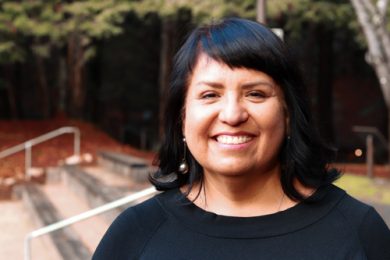Rebecca Hernandez To Serve As Campus’s First Community Archivist

Rebecca Hernandez, the former director of UC Santa Cruz’s American Indian Resource Center (AIRC), is now the university’s first community archivist.
In this new role, which re-envisions the university’s Regional History Project, Hernandez will focus on ensuring a broad representation of the history of Santa Cruz County. She is charged with seeking out partnerships with community organizations and leaders to support the preservation of community history, with a particular focus on reaching out to traditionally underrepresented communities. She will partner with the campus and community to develop and facilitate public history projects using a variety of methodologies including oral histories and exhibitions.
In announcing the new program, university librarian Elizabeth Cowell said that she considered it a particularly important venture which would “lead to the increased diversity of our collections and deepen our engagement with the campus and Santa Cruz County by offering tools and methodologies to collect stories and histories from all community members.”
Head of Special Collections & Archives, Teresa Mora, cited the success of such community-led endeavors as Watsonville is in the Heart. The community-led project is working in collaboration with UCSC students and faculty to document and promote the long-standing history of the Filipino community in Watsonville. She is eager to further similar partnerships providing opportunities for student engagement as well as community documentation.
The library conducted a nationwide search for the new position, and Mora stressed Hernandez’s track record in building relationships within the campus and community as what singled her out as a candidate. Mora noted Hernandez’s work with the AIRC, calling it “extraordinary.”
“She showed what could be done by establishing strong relationships on campus with faculty and staff and engaging with the student population,” Mora said. “I can’t wait to see Rebecca’s vision for this new program.”
Hernandez directed the AIRC for seven years starting in 2014, where she advocated for Native students and worked to connect with the larger university community.
“Together with the team, I developed relationships with faculty and staff to partner with the center on projects and events,” she said. “The programming hosted by the AIRC garnered national attention. Working with students and the resource center staff allowed me to grow and change—professionally and personally. I’ll always be grateful for the years I spent in that unit. Now I’m beginning a new chapter, one that allows me to bring what I’ve learned to the work I’ll be doing as the community archivist.”
Hernandez already has numerous ties to the community. She serves as vice president of the Santa Cruz Museum of Natural History board, is a member of the Latino Affairs Commission, and Rise Together, a program of the Santa Cruz Community Foundation working to advance racial equity in Santa Cruz County.
Hernandez has been interested in archives since her days as a graduate student. Her dissertation examines collecting practices and the inherent complexities in the public representation of cultures – including how the describing and defining of Native American objects aids in the construction of Amerindian identity.
Since earning her MA in American Indian Studies at UCLA and Ph.D. from the University of New Mexico, she has become even more passionate about how people and communities are represented in large institutions, especially in collections. She is looking forward to working in the library where she can engage her scholarly work in new ways, and help amplify community voices. She hopes her new post will allow her to encourage more students to become librarians and archivists and help their communities celebrate their histories.
The concept of community archives is a relatively recent phenomenon. Community archives and other community-centric history, heritage, and memory projects work to empower communities to tell, protect, and share their history on their terms.
“I’m looking forward to working with my new colleagues to shape the community archives here at UCSC and to building lasting connections both on and off campus through our efforts,” Hernandez said.
Original Link: https://news.ucsc.edu/2022/01/community-achivist.html.
